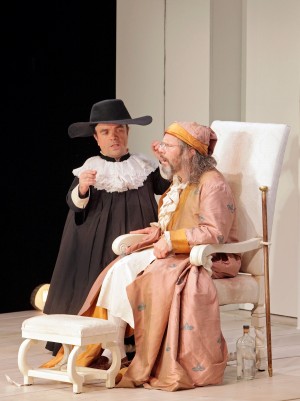Molière Was Alive and Victorious at Bard Summerscape 2012 in ‘The Imaginary Invalid’
The Imaginary Invalid, by Molière, was first produced in 1673, but the production staged at Bard College in mid-July as part of Bard Summerscape’s 2012 festival was as up to date — and funny — as a play can possibly get.
The action began even before having entered the theater, as one walked across the bucolic campus toward the magnificent Fisher Center for the Arts, a lofty Frank Gehry building, whose shiny titanium exterior catches the sun at dramatic and beautiful angles that change depending on the time of day or the onlooker’s perspective. And then there was the stage — in the center’s black box theater — that can be altered to fit each production. For The Imaginary Invalid, they built a wide, raised plank that showed two floors, with the audience seated, stadium-style, on either side, perfectly placed to watch each other as well as the play. The production itself featured a strong all-male ensemble cast (which is how it would have been done in Molière’s day) that worked with energy and daring and had so much fun in the well-directed chaos that the audience could not help but be drawn in.
The story of The Imaginary Invalid centers on Argan, a confirmed hypochondriac resorting to so many extreme remedies –most of them having to do with his poor digestion — that he may have actually succeeded in making himself ill. His maid, Toinette, is completely skeptical of him, mischievous and downright disrespectful which, of course, drives Argan crazy. When his nervous daughter, the hilariously squeaky Angélique, falls in love with a man at the theater, Cléante, Argan thinks she should marry a doctor instead to ease the burden of his medical bills — and so the fun begins. Argan’s choice of prospective son-in-law is a blithering idiot who alienates everyone in the household within his first three sentences, and the appearance of the daughter’s real love in the guise of a music teacher (which he is not) confuses things further. Toinette is pivotal in moving things along, and subplots include Argan’s brother, who does not really feel Argan is that ill, and Argan’s gold-digger wife, Béline, who is trying to send Angélique to a convent to take her out of the line of inheritance. Indeed, by the end of the play, Argan himself is convinced who is and who is not on his side, and decides he himself should become a physician, if only to save money. Unfortunately, he drops dead before that can happen — and so the play ends.
Many people came to this play for what can only be called the privilege of seeing the astonishing Peter Dinklage, Emmy-winning actor and star of The Station Agent and HBO’s hit series Game of Thrones, as the cute but cunning maid Toinette; but while his character was pivotal, and he seemed to have fun bouncing around in a flouncy dress and maid’s cap, this was a cast of talented equals. As Argan, Ethan Phillips effused just the right balance between imagined pain and hilarious lack of self-knowledge and opportunism. As his wife, the greed simply rolled off Zachary Booth’s fancy dress like lava off a volcano, an impulse that could not be stopped. Preston Sadleir as Angélique was so good at playing Nervous Nellie that one would have wished her father would have found her a remedy or two for anxiety, and Damian Young, as the proposed medical son-in-law, embodied that person we all know whose social timing is always about two steps off. Dinklage was superb as Toinette. Rushing up and down the stairs, stomping his feet on the stage, baiting Argan, and making sure Angélique and Cléante end up together, and even when the master keeled over dead, he simply shrugged off the absurdity of the whole situation and so became the play’s rational anchor — albeit with a wink.
That the cast worked so well together is a credit to the director, Erika Schmidt, who has helmed other plays at Summerscape, including Uncle Vanya, and is also married to Dinklage. The comic timing was near-perfect from the beginning to the end, and to accomplish that required that the actors not only trust the director but grow to trust each other as well under a director’s steady hand. The stage was imaginative and unique, totally modern but echoing historic theaters from Greece to Great Britain, owed to the ingenuity of set designer Laura Jellinek. One of the hallmarks of Summerscape is to “rediscover” classic pieces of art, and they certainly succeeded here, as Molière was a favorite of Charles-Camille Saint–Saëns, the composer around whom the Bard Music Festival is based this summer and whose music will be featured through much of August. Summerscape is a novel idea in a gorgeous location with an incomparable theater space — and a place that you’ll want to return to again and again, not only for the high level of professionalism, but also because it is, quite simply, fun.


